|
A Few Questions Pete Sampras
The following questions were asked over a two week period at the US Open.
Q. Rod Laver and McEnroe were saying the level of your play after the record and the Wimbledon victory you're just able to relax in a way that you couldn't until you had it. Now it's all gravy; you can go out there and hit.
Pete Sampras: Well, I never looked at the record as a pressure,... I never thought I'd ever do it as a youngster growing up. It's happening. I think when 11 came around and then 12, then the talk of breaking the record, but it was unfair to say the word was, "Pressure." It was an opportunity that I would have loved to have broken it one day. I'm obviously glad I've done it. I still kind of am flying high from what happened. I'm not saying I'm any more relaxed now than I would be here last year when I had 12, but, you know, I always want to do well at the Slams and try to add on to what I have already. But, you know what happened a month and a half ago is probably as good as it's ever going to get for me as a tennis player I think. Unless one day I win the French. But we'll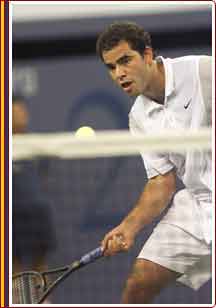 see if that happens. But, you know, I'm ecstatic I did it; I really am. But I feel at this point I can add on to it and maybe even add one or two more before it's all done. see if that happens. But, you know, I'm ecstatic I did it; I really am. But I feel at this point I can add on to it and maybe even add one or two more before it's all done.
Q. Are you doing anything special to minimize injuries?
Pete Sampras: I'm just cooling down after my matches, going out stretched out and warmed up, just being a little bit more aware of my body and making sure it's warmed up. I mean, that's the key for me. I paid the price for going out and taking my body a little bit for granted. Hurting my back I think woke me up to being a little bit more aware of my conditioning, being in better shape.
Q. You work with different fitness trainers. How does The Moose differ?
Pete Sampras: Moose is someone who keeps it fun. We do the runs, but we do other things, play basketball, play football, keep it fun. Also, you know, when it's time to work, we work. It's been getting in a routine of my back exercises and being more disciplined with that. That's one thing he's harped on with me, on my days off here, do something, go for a light jog, stomach exercises, your back. A little bit more discipline on the road, which I haven't really done much.
Q. Is this the most intense training you've done with a fitness coach?
Pete Sampras: I don't think it's the most intense, it's just being more consistent. I mean, that's the word I'm going to use. I had two days off. On the one day off, go for a run, do a few things here and there to keep in good shape. But, you know, it's time to rest, you rest. But it was time to train. We communicate well. We try to figure out when the next two, three years, however long I play, that I'm in the best shape.
Q. You obviously made yourself available to play Davis Cup this year. Injuries happen. But what was your feeling toward the Olympics and why did you decide against it?
Pete Sampras: It was never really a consideration this year to play the Olympics. When I made my schedule this year, playing Davis Cup and Olympics, I wasn't going to play. And to have Davis Cup and the Olympics in the same year is just a sign that the schedule's pretty messed up. I was in Barcelona, had a good time playing there. You 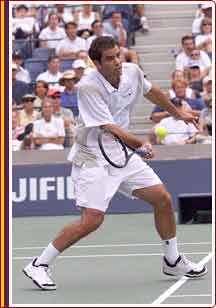 know, when you think of the Olympics, you don't necessarily think of tennis. I'm glad it's there, but you think of the Olympics, you think of track and field and swimming and tennis, 128 draw, I think they should change the format, make it into a team concept, like a World Team Cup concept where you have, you know, you could have Andre playing on Court 1, Tarango playing on Court 8. That's, you know, I felt that in Barcelona, that there wasn't any sort of team unity. It was, "Everyone's on their own," and we do that week in and week out. But -- so I just, you know, it's a long trip and I just never really considered going. know, when you think of the Olympics, you don't necessarily think of tennis. I'm glad it's there, but you think of the Olympics, you think of track and field and swimming and tennis, 128 draw, I think they should change the format, make it into a team concept, like a World Team Cup concept where you have, you know, you could have Andre playing on Court 1, Tarango playing on Court 8. That's, you know, I felt that in Barcelona, that there wasn't any sort of team unity. It was, "Everyone's on their own," and we do that week in and week out. But -- so I just, you know, it's a long trip and I just never really considered going.
Q. You obviously have been playing the sport of tennis since you were a young boy. Could you step back for a moment and reflect on what gives you the most joy about being a tennis player, playing the sport?
Pete Sampras: Well, it's setting goals, you know, going out in an arena like Wimbledon or the US Open, having every eye on you. It's a rush. That's something I'm going to miss when I'm done playing. You set the goal and you work hard and you achieve it. It's the best feeling when you wake up that next morning, after winning a Slam, and you feel great. You have ovations when you go out and play, people respect what you've done in your career. A number of different things make it fun. I love competing. I love playing in the biggest tournaments in the world, with the most pressure. I've always seemed to enjoy that.
Q. You made the comment the other day with 13 Slams under your belt, anything beyond this is a bonus. How comfortable are you with your place in tennis history?
Pete Sampras: I'm very comfortable (smiling). I have no complaints.
Q. What do you think that place is?
Pete Sampras: It's up to you guys really. I'm not going to sit here and claim I'm the best ever. I feel like I'm one of them. Certainly the critics will always say unless I win the French or get over that hurdle. But winning the French or not winning the French, if my career ended next year or five years, whatever, I didn't win the French, I feel pretty good about what I've done. I've done a lot more than I ever thought I would in the game. You know, at this point I'm just trying to add on to what I have already.
Q. A lot of athletes say when they've been around and achieved, the thing that goes first is not the legs or the eyes, it's the will to win, the concentration. Where does your motivation come from?
Pete Sampras: The motivation are the Slams. I mean, that's where I'm at in my tennis. You know, when you taste winning Slams throughout the year, you just want to keep on tasting them. I never forget what Jack Nicklaus said when he was winning majors, that's what motivated him. At this point in my career, that's where I'm at. You know, you'd like to win every title you play, but you look back at the year and you look at what you did at 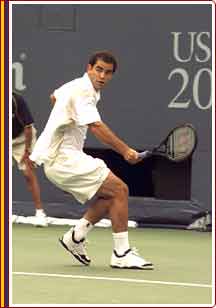 the majors, and that's kind of what keeps me going, motivated, try to add on to what I have already, feel good about my career, look back and not have any regrets on things that I should have done. When it's over, it's over. At the time, since I'm reasonably young and healthy, got the game, I might as well take advantage of it and try to make it 14. the majors, and that's kind of what keeps me going, motivated, try to add on to what I have already, feel good about my career, look back and not have any regrets on things that I should have done. When it's over, it's over. At the time, since I'm reasonably young and healthy, got the game, I might as well take advantage of it and try to make it 14.
Q. Billie Jean was talking about Connors and how she didn't think he had many what if's when he was 45 or 50; how Borg was going to have some what if's just because he walked away as early as he did. Is one of the reasons why you're still driving as hard for majors is that in 10 years or 15, that you don't want to ever walk away with major regrets about what you did, what you accomplished?
Pete Sampras: Oh, yeah. I mean, I've been asked that many times. I mean, my goals have always been the major tournaments. You know, I got the rest of my life to look back on my tennis. You know, I always pride myself on doing the right thing, preparing well, working hard, gearing my schedule to moments like this weekend. At 29, I feel like I've got a lot of good years left in me to really contend for major tournaments. That's what drives me and that's what keeps me going. You know, I don't want to have any regrets when I look back on my tennis, all the talent that I had, I kind of wasted it away. I wanted to take advantage of it.
Q. What you're saying about some good years left in you, do you think sometimes we, the media, look at you as an older tennis player?
Pete Sampras: 29 is still pretty young. I mean, you know, you look at someone like a Jordan or Gretzky, played till they're 35, I think. It's a different sport, team sport. Tennis players historically are done at 29, 30. I feel like I've got the game that I can play for as long as I want because of my serve. 29 is still pretty young, I believe. I mean, you can still do well in majors. Look at what Connors did for many years. He won majors at 30, 31. Look at Andre, what he's done. So it can be done. It's not that old (laughter).

It's weird at the ceremony. I (sampras) usually hold up the big trophy (smiling).
|
Q. Along the line of looking back and regrets, are you sort of amused looking at 1991, when you actually seemed relieved to lose your championship?
Pete Sampras: Well, it was one of the regrets of something I've said to the press, when I lost to Jim. Obviously at that point in my career, I didn't know what I wanted, I didn't like the pressure, I didn't like coming back and trying to defend a title. It's not easy, and I didn't handle it well. But something evolved over the next couple years to really find that passion to win majors. You know, just a different competitor mentally, how bad I really wanted it. Losing that '92 final to Edberg really woke me up to what I wanted from the game. I didn't like that feeling of giving in in that match. Only one person gets on that trophy. That definitely changed my career.
Sampras, on losing at the Open and the young guns
Marat Safin and Lleyton Hewitt
Pete Sampras: I mean, he's (Safin) just more powerful, I think. He serves harder than I did at 19. Our games were different. I was more of a slasher coming in, serve-and-volleying more. You know, I think with Lleyton, they're the future of the game. Doesn't have very many holes. Moves well for a big guy. Got some great gets today. I mean, he's going to be a threat here. He's going to be a threat at the French, at Australia. The grass might be a struggle. But he's going to win many majors,...
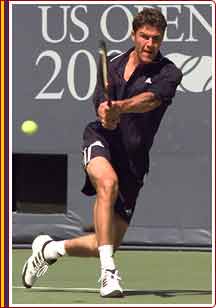
I lost to a young guy that's got a good future,.. Obviously, it's a huge win for him. But I'll be back.
|
Well, I feel like, you know, I lost to a young guy that's got a good future, that got hot today. You know, the next time I play him, if it's here next year or down the road, I mean, I'll be surprised if he can play like that for that long. But I don't want to say changing of the guard. Obviously, it's a huge win for him. But I'll be back.
Q. Does what happened to you today give you a greater appreciation for what you inflict on other guys when you're playing well?
Pete Sampras: Yeah. I can be pretty good sometimes (laughter). Like I've said, it hasn't happened to me that often that I've gotten kind of carved wax like that. But it's happened. I didn't really expect him to -- I knew he was going to play well, but I didn't think he was going to play that well that long. I figured he would get a little bit nervous. He came out swinging away, served huge. You know, the guy's got one of the biggest serves in the game, he really does. I mean, couldn't read it. Just has got a lot of power.
Q. It's been five years since you lost in a Grand Slam final. Was it strange to have the sensation again after so long?
Pete Sampras: It's weird at the ceremony. I usually hold up the big trophy (smiling).
Q. Do you think they'll be the Pete and Andre of the future?
Pete Sampras:: It's hard to say. There are other guys that could, you know, threaten them. But, you know, Pete and Andre was pretty special when we had it. You know, it will be a long time before you see two Americans kind of doing what we did for those years.
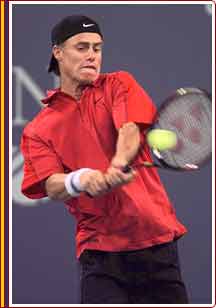
Lleyton is in the same league as Chang. He has unbelievable footwork
|
Q. Your thoughts on Lleyton?
Pete Sampras: He's playing great. You know, he possesses some of the best footwork and one of the best movers we have in the game. He's improved his serve and he's popping in some aces. He's a feisty young guy that's not going to give me any free points. It's a lot like playing Michael Chang as far as their games.
Q. Over the years, have you come across many people that move across the court quicker than Lleyton?
Pete Sampras: I always felt that Michael Chang was probably the best mover. I think Lleyton is in the same league as Chang. Has unbelievable footwork, I mean really does. He really forces me into errors because I'm going for too much, returns great. But I think he and Michael are the two best movers I've ever played.
Q. Are you surprised at how far he's progressed, how quickly he's risen?
Pete Sampras: I mean, no. Look at his year. He's had a great year. He's won titles, he's beaten top players. You know, I think we know he's one of the guys that's going to be the future of the game. I mean, he's going to be for as long as he wants to because he's got that mind and that heart to be in the top. And his game is getting more powerful with his serve.
|
 see if that happens. But, you know, I'm ecstatic I did it; I really am. But I feel at this point I can add on to it and maybe even add one or two more before it's all done.
see if that happens. But, you know, I'm ecstatic I did it; I really am. But I feel at this point I can add on to it and maybe even add one or two more before it's all done. know, when you think of the Olympics, you don't necessarily think of tennis. I'm glad it's there, but you think of the Olympics, you think of track and field and swimming and tennis, 128 draw, I think they should change the format, make it into a team concept, like a World Team Cup concept where you have, you know, you could have Andre playing on Court 1, Tarango playing on Court 8. That's, you know, I felt that in Barcelona, that there wasn't any sort of team unity. It was, "Everyone's on their own," and we do that week in and week out. But -- so I just, you know, it's a long trip and I just never really considered going.
know, when you think of the Olympics, you don't necessarily think of tennis. I'm glad it's there, but you think of the Olympics, you think of track and field and swimming and tennis, 128 draw, I think they should change the format, make it into a team concept, like a World Team Cup concept where you have, you know, you could have Andre playing on Court 1, Tarango playing on Court 8. That's, you know, I felt that in Barcelona, that there wasn't any sort of team unity. It was, "Everyone's on their own," and we do that week in and week out. But -- so I just, you know, it's a long trip and I just never really considered going. the majors, and that's kind of what keeps me going, motivated, try to add on to what I have already, feel good about my career, look back and not have any regrets on things that I should have done. When it's over, it's over. At the time, since I'm reasonably young and healthy, got the game, I might as well take advantage of it and try to make it 14.
the majors, and that's kind of what keeps me going, motivated, try to add on to what I have already, feel good about my career, look back and not have any regrets on things that I should have done. When it's over, it's over. At the time, since I'm reasonably young and healthy, got the game, I might as well take advantage of it and try to make it 14.

